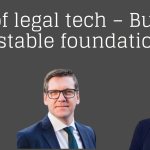Deloitte Legal and generative AI provider Legora on 8 September announced a strategic relationship in the UK, within which the Deloitte Legal team is using Legora for its own review, research and drafting tasks internally as well as helping in-house legal teams and law firms with their own adoption. Legal IT Insider’s editor Caroline Hill spoke with Tom Brunt, a partner in the legal management consultancy team at Deloitte and also Legora’s head of UK & Ireland and head of legal engineering, Alex Fortescue-Webb, about what the partnership will entail and why the two organisations say it will drive the next wave of transformation.
Caroline Hill (CH)
Tom Brunt (TB) 
In the UK we then built on the learnings and experience from our our colleagues in Sweden to really look at how we can replicate and build on that and expand that. I’ve been working closely with Alex and we have really grown and built this out for the UK market as well as building in different components of the collaboration going forward. As has been been mentioned as part of our announcements, we’ll be implementing this for clients and working together on expanding client implementations and co-build of solutions.
CH So did you go through a big selection process or or did you have to just speak to Sweden and they were loving using it?
TB Yes the experience has been very positive from Deloitte Sweden both in terms of the technology, but also the experience of working together with and between our organisations. So it’s been very easy. We share very much common views of where the impact and opportunities lay for AI within the legal sector and I think that’s been shared absolutely with my UK team working with Alex and the wider group. It’s about a combination of the capabilities that both of our organisations bring as well as their culture, and the ways of working have been excellent.
CH Alex what are your observations from Legora’s perspective?
Alex Fortescue-Webb (AFB)
CH Yes Deloitte is obviously huge, isn’t it, so it’s important to be clear that this partnership for now is for the UK? I know Richard Punt was quoted in the announcement and he’s global legal head isn’t he? So is it UK legal, but with the potentially that it might be expanding?
TB Yes so so Richard is the global head and and we are exploring building on the Swedish foundations. What we’re doing in the UK, we’re exploring replicating that globally. But there’ll be more to come on any wider plans beyond the UK.
CH Can you tell me about how the teams within Deloitte are using Legora internally?
TB Yes it’s effectively a platform that’s that’s being deployed across different legal practise areas and being used for a wide range of activities from to helping draught review, compare, and analyse legal documents, plus providing more data and insights from our knowledge base and repositories to clients and being able to provide a broader coverage of legal documentation through the use of AI. So it’s a lot of the core capabilities of Legora being embedded in how we how we deliver our legal work to clients.
AFB I think one thing that’s interesting with Deloitte Legal that is possibly different to some law firms is the breadth of the work that you guys do. So it’s everything from your advisory work and then right down to managed services type applications where you’re dealing with high volume. So the breadth of the use cases is very, very wide, which I think is really interesting. Obviously from our perspective. But I think it’s also a really good illustration for customers as your clients as to the ways that they can use AI to enhance their own legal workflows. You can show them it’s being done at Deloitte.
CH I wanted to unpick the external work you’re doing together and I thought it would be useful to look at the press release. You said that you will be collaborating to drive the next wave of legal transformation. You also said that Deloitte and Legora share the strategic vision that AI can transform the value of legal through the delivery of better business outcomes. And then, and I want to come back to this because I want to understand what it means, you said realising this vision involves a profound reshaping of the operating model for both in-house teams and law firms.
First up let’s talk basics about the sort of work and how you’re going to be working together in terms of the client side of things and then we’ll come back to what it means.
TB Yes sure, so clearly a big part of this – the ‘new’ part of this – is that this team is going to be helping to implement Legora at our clients, both in-house legal teams and law firms. This is where I think we really share the same vision that this technology is not a case of you deploy it and then with one quick deployment you’re done. It’s very much about continuing to to work with legal teams to iterate and identify the best use cases continue to build out workflows; tailor AI use cases to the specific needs of different legal teams; and continue to build out more complex, high value use cases so that you’re really continuing to get the best out of the technology and evolve your use of technology as a legal team.
As AI continues to develop and develop and develop, and Legora platform will be getting more, and more powerful capabilities. You’re continuing to make most of those and embed those in the in your ways of working. So that’s very much the approach that we’ll be taking and why Deloitte can leverage our consulting capabilities in terms of process; engineering; data analysis; project management technology and change management. I think it’s a really good combination for clients to be able to get more value out of AI in the short, medium and long term.
CH It sounded from the press release as though you would be working with customers who are already Legora clients, is that the case or are you going to be effectively helping to cross sell, how will it work?
TB It’s predominantly going to implementing this together at clients and clearly we’ll be working together with our respective clients to identify opportunities to work together across both our client bases.
CH So are you recommending Legora effectively? I know Deloitte Legal has got a long history of tech partnerships so in the work that you’re doing with clients and are you effectively saying to clients, ‘We would recommend this as your platform’?
TB It’s a great question: Deloitte has an ecosystem of clients and part of our role is often working with clients to determine the best technology fit for their specific business, their challenges, their opportunities. So we play a role and continue to play a role where we’re advising on the best technology fit for the best client. It’s not an exclusive situation where we’ll be recommending Legora regardless in every situation. We have an ecosystem of providers and this collaboration is about having a deeper relationship with Legora where we we work together more closely so we can deliver better solutions for clients. So as part of that, we do expect there’ll be lots of clients where Legora will be a very good fit and the right fit. We’re expecting to see a lot of clients that we’ll we’ll be working together on.
AFB The thing that’s really I think powerful with this sort of collaboration is, if you think about a higher level, if you think about AI and the impacts on the legal profession, there is the potential, and actually I’d say the likelihood, that it will change every single legal workflow for every single lawyer within the next sort of two, three, four, five years. That in itself is an enormous change, particularly when you’ve got people who have got established ways of working. All of that background means that the change piece here is often underestimated.
If you take corporate legal teams, there are a lot of knock on effects because this needs to be built into the wider ecosystem of the organisation. There’s probably angles around how legal interacts with the front office, the sales team, the compliance team, all of these other interfaces. And then how do you turn the legal function into more of a an enabling capability powered by AI effectively. That change piece is just gigantic and you know over the next two-three-four-five years will be will be the biggest impact of all.
CH That’s so key to adoption, isn’t it? I have so many fascinating conversations right now around the fact that there’s more enthusiasm, there’s more actual buying of tech and there’s more budget, but what there isn’t a lot of the time is more ability to put really meaningful change into practise and that is behind some of the recent disillusion: there’s an anticipation that things are going to change overnight and then suddenly it doesn’t happen.
AFB Yes if you take it to the ridiculous extreme, if you have the perfect AI platform but no one uses it, it clearly has no impact, and we’re very cognisant of that and that’s definitely one of the drivers here.
CH It was really interesting to see that in Sweden, they said examples of the work Deloitte has done is helping customers to navigate how Legora integrates with existing IT such as ERP systems; ensuring that implementation complies with legislation and client AI policies. For example. I thought that was quite interesting as an examples of how you might be working.
TB Yes, I think what we’re saying with our work with in-house clients is that with the Legora platform and platforms like Legora, a key next part is going to be integrating those with different platforms and capabilities within legal and the wider business so that it’s more of an ecosystem and in particular this this point around getting better access for legal teams to data, knowledge, and precedent sites. That’s where we see the next wave of AI transformation really going and that’s historically been difficult to do. But I think that’s one of the really exciting opportunities that comes from AI. So for example, integrating the core with document management repositories and systems that in-house legal teams have. So then you’re able to analyse and surface insights from those documents as lawyers are doing as doing their work, providing their advice, providing their solutions into their business. That is an area that’s always been traditionally quite hard to do, but I think could provide a step change in capabilities for in-house legal teams in terms of how they can support their business clients.
CH Yes, it’s probably conversation for another time, but is everyone getting excited about MCP (model context protocol) and what you can do with it. I seem to spend a lot of my time talking about that, is that something you’re talking to clients a lot about?
TB Yes we’re starting to. Agentic AI is the next big topic, so it’s definitely something we’re focused on.
AFB One of the powerful things is that while historically legal technology has been quite narrowly focused, what MCP enables you to do is where problems have been solved, even if they’re very specific, you can still potentially use those solutions where you know a lot of human capital has been put into them. So one example is automated drafting tools like Contract Express, where some organisations have put thousands of hours into building out their templates and their ability to use that. You don’t need to throw all of that away just because you’re adopting an AI platform. You can still use all of that, and actually you can potentially integrate it into whatever workflows you’re doing in the context of AI. So it enables you to bring a lot of things together in a complementary way rather than having to choose between, ‘Oh, do I buy this and then shut this down?’
CH Yes brilliant, we’re hosting our own event at the end of October and one of the panels is going to be talking about that. We just have a few minutes left and I want to go back to your observations about this partnership reshaping the operating model. It’s quite a big claim really. I’m not under any illusion how much GenAI is going to change things but can you substantiate why this relationship and what the work you’re doing will do those things we mentioned above.
TB So I think the industry in general at the moment has been quite focused on using AI to just do legal work the way it is done today but do it a bit faster and a bit more efficiently and productively. Our view and the work we’re starting to do more and more as a consulting team now is about more fundamental redesigns of legal workflows and processes. We’re looking at how you can really use data and knowledge differently. Looking at the changing relationship between work; what’s handled in-house; what goes external and how that partnership and relationship works.
And so we are seeing changes and shifts there and including in the different skills and capabilities that are evolving and changing over time. So we’re doing more and more work in that space to help clients on that transition. We’re already seeing that shift happening and for us, we want to be working with partners that can help really push that next wave of transformation. And that’s why this collaboration with Legora is really exciting for us because we think their their platform and capabilities are going to be the core really of enabling that next wave of transformation.
AFB I agree, I think the steps so far have been about, ‘How do we do this today and how do we start to take parts of that workflow and add AI,’ and sometimes you get fantastic results and it’s partly about efficiency. I think there is also a quality element in some contexts as well. So we’ve done detailed testing on things like complex data extraction from large volumes of contracts like the kind of due diligence type scenarios, and in some cases you find that you know the tech is out-of-the-box more accurate than human review, for example. And that’s, you know, most likely because the volume that was there and that people were rushing and so on and so forth. But you’re already starting to see people are appreciating that we can reinvent how work is actually done, although there’s a lot of work to do to to sort of get there.
CH Do you have corporate clients that are looking to completely reinvent themselves in terms of how work is done and want to blow up their model?
TB I wouldn’t say it’s that extreme, but we’ve got clients that are absolutely revisiting their operating model for the next three to five years and rethinking the decisions around all of the points we’ve discussed. So we’re seeing a lot more organisations move from ‘this is a technology project just getting started for six months and we’ll see how it goes’ to a more strategic three to five year project that’s really rethinking the shape of and operating model of both in-house teams and law firms. We’re doing projects like and we’re seeing more and more organisations starting to think like that.
AFB I would agree with Tom that we don’t see clients in quite that extreme position but we do have some individual stakeholders who are thinking along those lines, in that they want to completely blow it up and redo everything. There’s probably a question as to how much influence will they have and how much ability will they have to push the model fully in that direction but it is interesting. As with everything, you see a spectrum within every organisation in terms of ambition and buying and so forth but there’s some really interesting discussions out there.
CH We’re at time unfortunately. These deep dives are so important and I appreciate you making the time to help me understand the work that is being done now and then further down the line perhaps you know a bit more. Is there anything important that I haven’t asked you?
TB We haven’t touched on the co-build solution, so maybe just a brief point on that because although it’s early stages and still exploratory, it’s a really exciting development that we will see more in the industry. So the codifying of knowledge and expertise and know how from providers like Deloitte into platforms and products like Legora and that then being made available to clients through platforms. We’ll be sharing more in due course and although it’s early days, it’s something we’re really excited about from this collaboration as well.
My thanks to Tom and Alex for a really fascinating chat that helps us to understand more about the ambitions of this collaboration.









